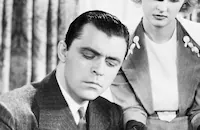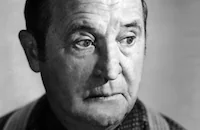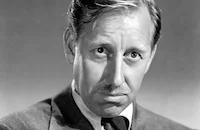The Meanest Man in the World
Brief Synopsis
Cast & Crew
Sidney Lanfield
Jack Benny
Priscilla Lane
Rochester
Edmund Gwenn
Matt Briggs
Film Details
Technical Specs

Synopsis
Lawyer Richard Clarke has a small legal practice in Pottsville, New York, but as his black assistant, Shufro, points out, Clarke is just too nice to make any money, for he refuses to charge his poor clients or accept morally questionable clients. Clarke is in love with pretty Janie Brown, whose successful father wants her to marry wealthy Bill Potts. One afternoon, Janie and Brown visit Clarke's office, and after Brown leaves, his car is hit by a truck-driving farmer. Hoping to impress Brown, Clarke takes the case to court and sues the farmer for damages. Upon learning how impoverished the farmer is, however, Clarke gets the case dismissed. Brown pretends to be pleased with Clarke's ability to temper justice with mercy and encourages him to go to New York City to make a name for himself. Oblivious to the fact that Brown actually is trying to get rid of him, Clarke, accompanied by Shufro, gamely makes the move. Four months pass as Clarke's bills accumulate and not a single client comes through his door. One day, Clarke receives word that Janie and Brown, who think he lives in luxury on Park Avenue, are coming to visit, and in a panic, he and Shufro try to find a suitable apartment. While visiting one ritzy building, they hear a husband and wife arguing, and after the couple leave, Shufro installs Clarke in their apartment. Clarke brings along Brown and Janie, who wants to marry the lawyer immediately. Clarke insists that they wait for one month, and when the arguing couple return to the apartment, Clarke hustles Brown and Janie out for a tour of nightclubs. The next day, Clarke admits to his secretary, Miss Crockett, that the club hopping used up the last of his money, and Shufro urges him to become meaner to attract clients. Determined to practice being mean, Clarke goes for a walk, during which he steals a little boy's lollypop. A passing photographer snaps a picture of the act, which is then immortalized in the next day's newspaper with the headline "Meanest Man In The World Takes Candy From Baby!" Clarke is mortified, but soon feels better when billionaire Frederick P. Leggitt, who is looking for an unscrupulous attorney, arrives at his office. Clarke accepts a large retainer from Leggitt, then begins his first assignment, which is to evict Leggitt's elderly sister-in-law Frances. Shufro arranges for a photographer to get a picture of Clarke dispossessing Frances, and the publicity brings him even more clients. Unknown to the public, who fear that Frances has committed suicide, Clarke installs Frances in his new apartment. Soon after, Clarke is telling Leggitt about the eviction when Janie arrives to plan their wedding. Horrified to learn of Clarke's apparent change in character, Janie breaks off their engagement. While Clarke is getting drunk in a hotel bar, a body, presumed to be Frances', is found in a river. A reporter calls Clarke's apartment for a comment, and when Frances answers, she refuses to give her name and says only that she lives with Clarke. Meanwhile, Clarke has met the equally drunk Janie in the bar, and when she hears a radio report that he is living in a love nest with an ex-Follies star, she slaps his face. A photographer captures the moment and it is published in the newspaper with a caption identifying Janie as Clarke's love nest partner. An infuriated Brown abducts Clarke and takes him to Janie's apartment, and after the couple are tied up, a Pottsville judge persuades Brown to allow him to marry them. Brown also agrees to get Clarke a job as attorney for the Pottsville bank, where he can reform and become a good husband. The delighted Janie then reveals that Shufro and Frances have already told her the truth about Clarke's "mean streak."

Director
Sidney Lanfield
Cast

Jack Benny

Priscilla Lane

Rochester

Edmund Gwenn
Matt Briggs

Anne Revere
Margaret Seddon
Helene Reynolds
Jackie Averill

Lyle Talbot

Don Douglas
Harry Hayden
Arthur Loft
Andrew Tombes
Paul Burns
Ralph Byrd

Frank Orth

Mae Marsh
Chester Clute
Robert Emmett Keane
Ed Gargan
Ed Dearing
William Newell
Hal K. Dawson
Bud Mccallister
Nicodemus Stewart

Gary Gray
Conrad Binyon
Harry Mckim
Gerald Mackey
Freddie Walburn
Dave Morris
Margaret Mcwade
Mary Currier
Frank Jaquet
Harold Minjir
Sam Hayes
John Hiestand
Tor Johnson
Philo Reh

Frank Ferguson
Milt Kibbee

Will Wright
Gladden James
Edward Clark
Besse Wade
Tom Dugan
Crew
Robert Bischoff
Richard Day
W. D. Flick
Paul S. Fox
William Goetz
Roger Heman
Albert Hogsett
Allan House
Thomas Little
Ernst Lubitsch
Earl Luick
Wilkie Mahoney
Peverell Marley
Cyril J. Mockridge
Emil Newman
Guy Pearce
William Perlberg
Aaron Rosenberg
Morrie Ryskind
George Seaton

Film Details
Technical Specs

Quotes
Trivia
Notes
A 1 November 1939 Los Angeles Times news item reported that Universal was trying to purchase the rights to Augustin MacHugh's play. According to a May 13, 1942 Los Angeles Examiner news item, Walter Lang was originally scheduled to direct this film, and Maureen O'Hara was cast as "Janie Brown." On June 17, 1942, Hollywood Reporter noted that due to his illness, Lang was being replaced as director by Sidney Lanfield. Priscilla Lane was borrowed from Warner Bros. for the film, while Eddie "Rochester" Anderson was borrowed from Paramount and Anne Revere and Edmund Gwenn were borrowed from M-G-M.
The film's troubled production history is detailed in Hollywood Reporter news items, which reported that the story, purchased on the strength of Jack Benny's success in the 1941 film Charley's Aunt, went through numerous rewrites. According to the Twentieth Century-Fox Records of the Legal Department, located at the UCLA Arts Library, Benny, who had script, director and co-star approval, postponed the start of shooting several times. On July 8, 1942, both Hollywood Reporter and Daily Variety reported that the production, which was due to begin filming soon, had been called off by the studio, despite an investment of $150,000 up to that time. The screenplay had not met with Benny's approval, and on July 9, 1942, Hollywood Reporter noted that "one of the main difficulties in the controversy was Benny's objection to a part of the script that seemed to him to be too juvenile."
The film's problems continued after a sneak preview on September 25, 1942 in Huntington Park, CA, when it was decided to reshoot some of the scenes. A November 2, 1942 Hollywood Reporter news item commented that Morrie Ryskind, who had worked on early versions of the screenplay, was being called in to write material for ten days of retakes to be directed by Ernst Lubitsch. According to the news item, Twentieth Century-Fox stated that Lubitsch was replacing Lanfield as director because of Lanfield's commitment to Paramount, but the latter studio asserted that Lanfield was not needed at that time. Many contemporary reviews commented on how the production problems affected the finished film, especially in regard to its length. The New York Times reviewer noted: "Twentieth Century-Fox had more trouble than it bargained for in making the film, according to reports out of Hollywood, and the difficulties are apparent in the finished work." The Motion Picture Herald Prod Digest reviewer called the picture "a problem for showmen" due to its short running time, and termed it Benny's "most perplexing contribution to the theatre man's flow of screen ware."
After the film was released, another problem arose when a group of lawyers in New Haven, CT, filed suit to prevent the film from being exhibited because they believed that it "showed the legal profession in a disreputable light," according to a March 29, 1943 Film Daily news item. The next day, Film Daily reported that Superior Court Judge Patrick O'Sullivan denied the lawyers' plea for an injunction, stating that they had "no standing to obtain such relief." O'Sullivan did, however, commend "the plaintiffs' zeal in attempting to safeguard the profession." MacHugh's play was the basis for two other works, both entitled The Meanest Man in the World: in 1923, Principal Pictures produced a film directed by Edward F. Cline and starring Bert Lytell and Blanche Sweet (see AFI Catalog of Feature Films, 1921-30; F2.3536); and on July 6, 1955, a one-hour version of the play, directed by Sidney Lumet and starring Wally Cox and Josephine Hull, was televised by the CBS network on the U.S. Steel Hour.












